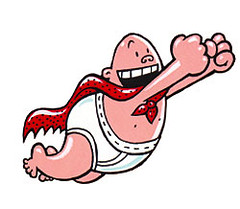Captain Underpants needs your help

Earlier this month the American Library Association announced their list of the most challenged books in 2004:
"The Chocolate War" by Robert Cormier, for sexual content, offensive language, religious viewpoint, being unsuited to age group and violence
"Fallen Angels" by Walter Dean Myers, for racism, offensive language and violence
"Arming America: The Origins of a National Gun Culture" by Michael A. Bellesiles, for inaccuracy and political viewpoint
the Captain Underpants series by Dav Pilkey, for offensive language and modeling bad behavior
"The Perks of Being a Wallflower" by Stephen Chbosky, for homosexuality, sexual content and offensive language
"What My Mother Doesn't Know" by Sonya Sones, for sexual content and offensive language
"In the Night Kitchen" by Maurice Sendak, for nudity and offensive language
"King & King" by Linda de Haan and Stern Nijland, for homosexuality
"I Know Why the Caged Bird Sings" by Maya Angelou, for racism, homosexuality, sexual content, offensive language and unsuited to age group
"Of Mice and Men" by John Steinbeck, for racism, offensive language and violence
emphases mine.
[The Chocolate War]drew complaints from parents and others concerned about the book's sexual content, offensive language, religious viewpoint and violence. This year marks the first in five in which the Harry Potter series does not top or appear on the ALA's annual list.
The ALA Office for Intellectual Freedom received a total of 547 challenges last year. A challenge is defined as a formal, written complaint, filed with a library or school requesting that materials be removed because of content or appropriateness. According to Judith F. Krug, director of the Office for Intellectual Freedom, the number of challenges reflects only incidents reported, and for each reported, four or five remain unreported.
"With several news reports just in the past week of books like "Bless Me, Ultima," by Rudolfo Anaya being removed from schools, we must remain vigilant," said ALA President Carol Brey-Casiano.
I don't have an absolute objection to censorship, at least not in the educational context. An elementary school library clearly shouldn't include Tropic of Cancer, whatever its literary merit, and I don't think I was deprived way back when because my high school library didn't have a copy of Ulysses. (But it did have Of Mice and Men and Catcher in the Rye and even books with pictures of naked statues from the classical era, without Ashcroft mandated fig leaves.) Now the first example(Tropic) is obviously a straw man as schools don't make those kind of ridiculously inappropriate choices, the point being that school librarians generally do just fine without fire-breathing right-wing pressure groups trying to tell them how to do their jobs. I'm particularly curious about Michael Bellesiles's "Arming America: The Origins of a National Gun Culture", apparently banned for its political viewpoint, as well as the "religious viewpoint" expressed in The Chocolate War. (Somehow I doubt the chocolate war expressed a dispensationalist view.)
I may write about some of these books in a future post(or posts). Dav(?) Pilkey's Captain Underpants drew my attention(how could it not?):
Kidsread.dom calls him an "elastic-waist adventurer fights for Truth, Justice and all that is Pre-shrunk and Cottony."
Dav Pilkey, who really does spell his name that way, has a website, where you can see the all-new captain underpants video, if you feel so compelled.
from A healthy Place:
Sally Shaywitz, Yale University professor of pediatrics and author of the critically praised Overcoming Dyslexia: A New and Complete Science-Based Program for Reading Problems at Any Level, notes that Pilkey's "own experiences as a dyslexic child growing up no doubt gave him sensitivity to the imperfections in all of us."
In her book, she urges that parents point out to their children that Pilkey, among many other achievers, struggled to learn to read. "Dyslexic children can imagine and dream and grow up to be wonderful authors like Dav Pilkey," she observes. "The ability to write and imagine has little to do with being dyslexic."
One of the most unusual aspects of Pilkey's books is his periodic use of phonetic spelling in the comics that George and Harold create. (They write words like "pore" for "pour.") Pilkey says he deliberately uses this kind of writing to encourage his readers to try writing and drawing themselves. "I'm hoping that kids will read George and Harold's comics, notice the mistakes and realize that creativity doesn't depend on proper spelling, flawless grammar or even perfect artwork. I'm hoping these 'less than perfect' comics will encourage kids to try being creative on their own, without the often paralyzing fear of 'messing up.' "
I fail to see what is so offensive about Captain Underpants. Parents have struggled for ages to get kids to read "edifying" works, generally to no avail. I'm reminded of that scene in Major League where Tom Berenger is sitting on the bus reading a "classics illustrated" comic of Moby Dick because he hopes to win back ex-girlfriend Rene Russo who had urged him to read it years earlier. The non-illustrated version, that is.
Finally, the ALA is selling a banned books t-shirt, which has a captain underpants logo on the front and says "elect to read a banned book" on the back. Supporting the American Library Association is one way to support intellectual freedom, and it could use a little support right now.





<< Home